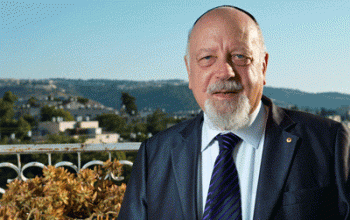April 12, 2021 by Rabbi Raymond Apple
Read on for article
Ask the rabbi…

Rabbi Raymond Apple
AN APIKOROS
Q. What is an apikoros?
A. It means “unbeliever”. Using this epithet is an insult only if you intend it to be such.
But though an apikoros is missing out on the inspiration that comes from being a believer, no-one can be forced to believe, and you cannot argue them into belief.
Homiletically, the word derives from “pakar”, “to break forth”, and hence it is someone who rebels against traditional religion; an associated word, “hefker”, means free or abandoned.
Historically, the name is from the Greek philosopher Epicurus (341-270 BCE), who believed that with the correct philosophy of life a person could reach “quietude of mind and steadfast faith”.
Associated with his name is the view that though the universe is eternal and infinite, nothing is created out of nothing and nothing passes into nothing. The soul is destructible; pleasure is the beginning and end of the good life. The existence of God or the gods is not denied, but God (or the gods) do not control the world or feel concern for man. (See Josephus, Antiquities 10:11:7; cf. Maimonides, Guide for the Perplexed 3:17).
Judaism found this problematical. It preferred seriousness and moral strictness to pleasure and indulgence. It believed not only that God was the Creator but that His Providence continued to rule the creation. It could not accept that God had abandoned His world and left it “hefker”, ownerless. It developed a firm doctrine of the two worlds – this world and the World to Come.
It applied the term apikoros to anyone who rejected these basic Jewish doctrines and warned that the apikoros had no share in the World to Come (Mishnah Sanh. 10:1).
In due course, it extended the meaning of the term very widely to anyone who did not show respect to the sages. Me’iri (13th cent.) defines an apikoros as one who despises a learned person and his learning and thus denies the things he should believe in (commentary to Sanh. 90a).
To Maimonides (Hilchot T’shuvah, chapter 3), an apikoros rejects prophecy and the prophetic status of Moses, and denies that God knows the deeds of human beings. The Shulchan Aruch adds that the apikoros not only lacks belief but transgresses the law on purpose, e.g. by eating forbidden food or wearing “sha’atnez”, a prohibited mixture of textiles (CH.M. 425:5).
There is a distinction between an apikoros and an “am ha’aretz”, an ignoramus. An unbeliever who is also an ignoramus is a major problem, because he does not know what it is that he does not believe in. Hence when the Mishnah says that one must know what to answer an apikoros (Avot 2:14), it may be saying that he must not be allowed to remain uninformed.
ALIYAH
Q. Why is immigrating to Israel known as Aliyah?
A. Biblical texts speak of “Aliyah” – “coming up” to the Holy Land, e.g. Shir HaShirim 3:6, “Mi zot olah min ha-midbar” – “Who is this that comes up from the wilderness?” There are 15 “Shirei HaMa’alot”, “Songs of Ascents” (Psalms 120-134), for the pilgrims coming up to Jerusalem.
“Coming up” is also used of the exiles who returned from Babylon (Ezra 7:9).
The going up may originally have been suggested by the hilly location of Jerusalem, but it was interpreted in a metaphorical way in view of the spiritual ascendancy of the Land.
Countless immigrants from the Diaspora have experienced the “n’shamah yeterah”, the “extra soul” that becomes grafted onto one’s life in Israel.
Zionist leaders all preached about this in either secularist terms (Israel as the place where a Jew finds a home, feels at home and becomes part of a dynamic Jewish culture) or religious (Israel is the place God has chosen, the place where one sees prophecy fulfilled and destiny unfold).
With the advocacy of Aliyah sometimes came denigration of the Diaspora. David Ben Gurion used to say that Judaism in the Diaspora faced the kiss of death, though many Diaspora leaders resented his criticisms.
They agreed that there was a danger of drop-out and drift from Jewish identity, but they pointed out that there are parts of Israel itself where people are what Ahad HaAm called “Hebrew-speaking gentiles” and parts of the Diaspora where Jewish identity and commitment are intense and unflagging.
The events of the last few decades have brought both sides a more realistic way of thinking. Both realise that they need each other and are part of one people and one history.
In Israel there are responsible sectors that know they must work harder to bridge the gaps between Israelis and Jewish heritage; in the Diaspora there is hardly a thinker or leader who does not work towards intensifying Jewish identity, education and observance.
Rabbi Raymond Apple served for 32 years as the chief minister of the Great Synagogue, Sydney, Australia’s oldest and most prestigious congregation. He is now retired and lives in Jerusalem where he answers interesting questions.
 RSS Feed
RSS Feed















 April 12th, 2021
April 12th, 2021  FAKE NEWS for the Zionist agenda
FAKE NEWS for the Zionist agenda  Posted in
Posted in  Tags:
Tags: 













